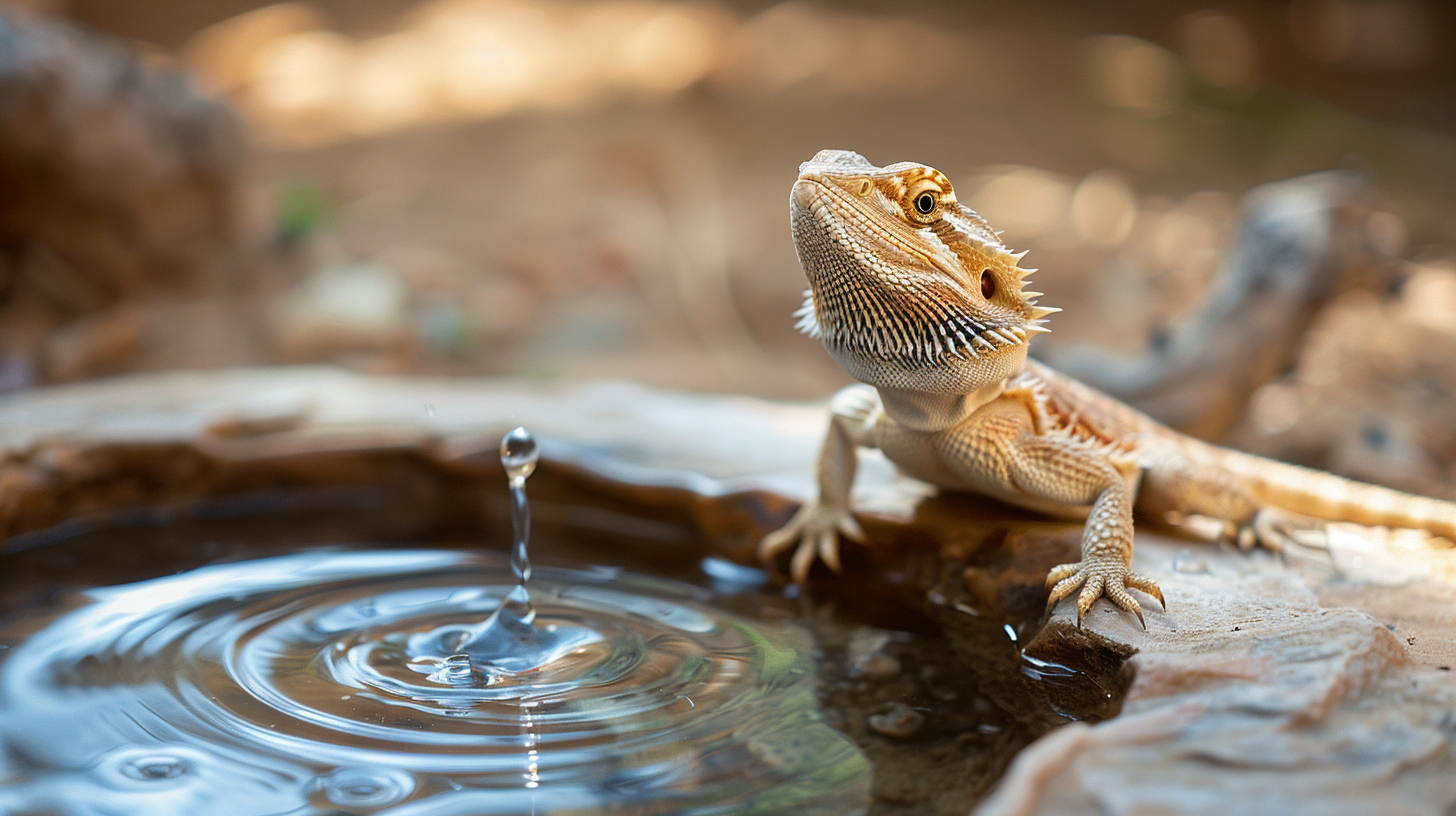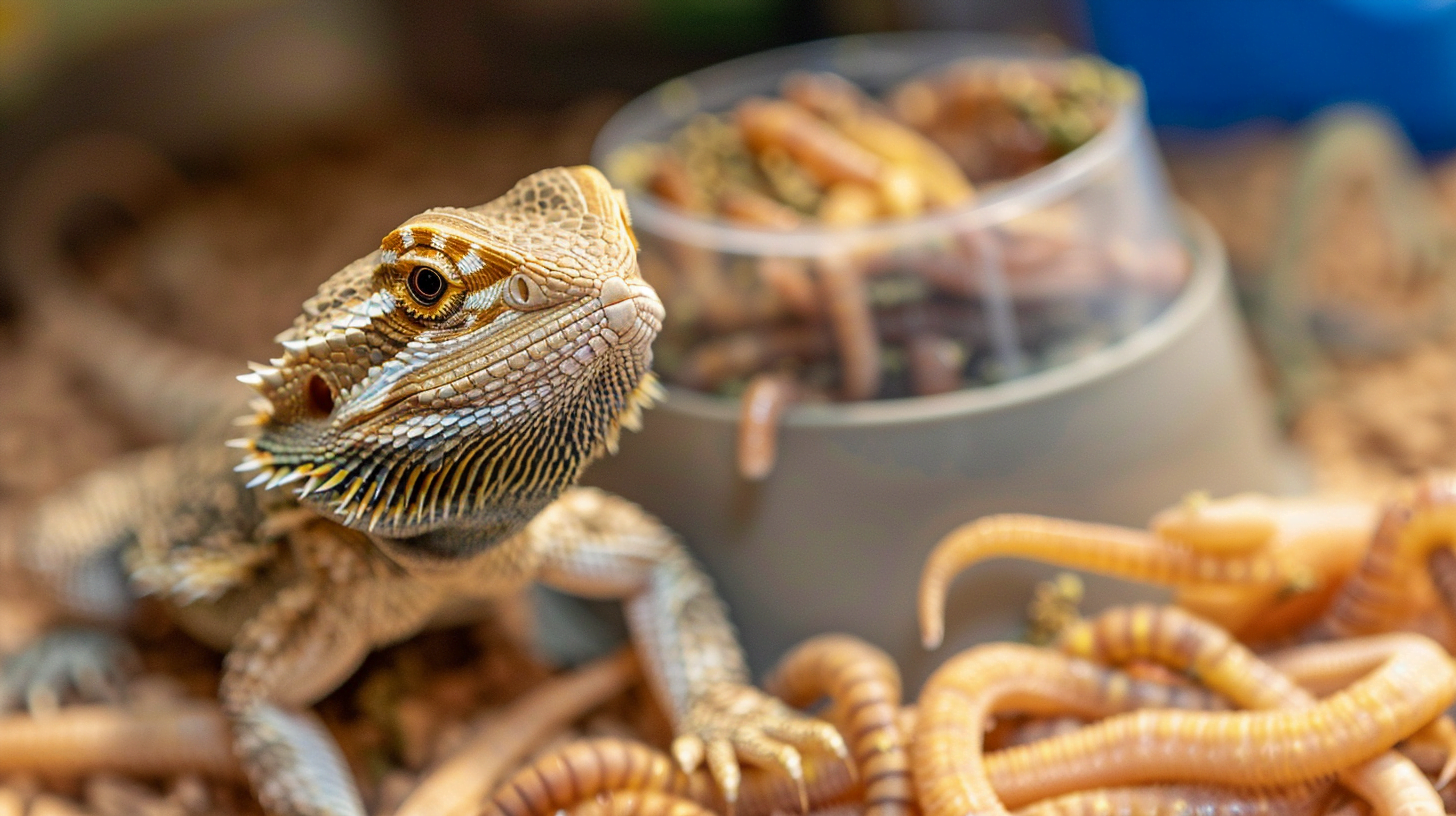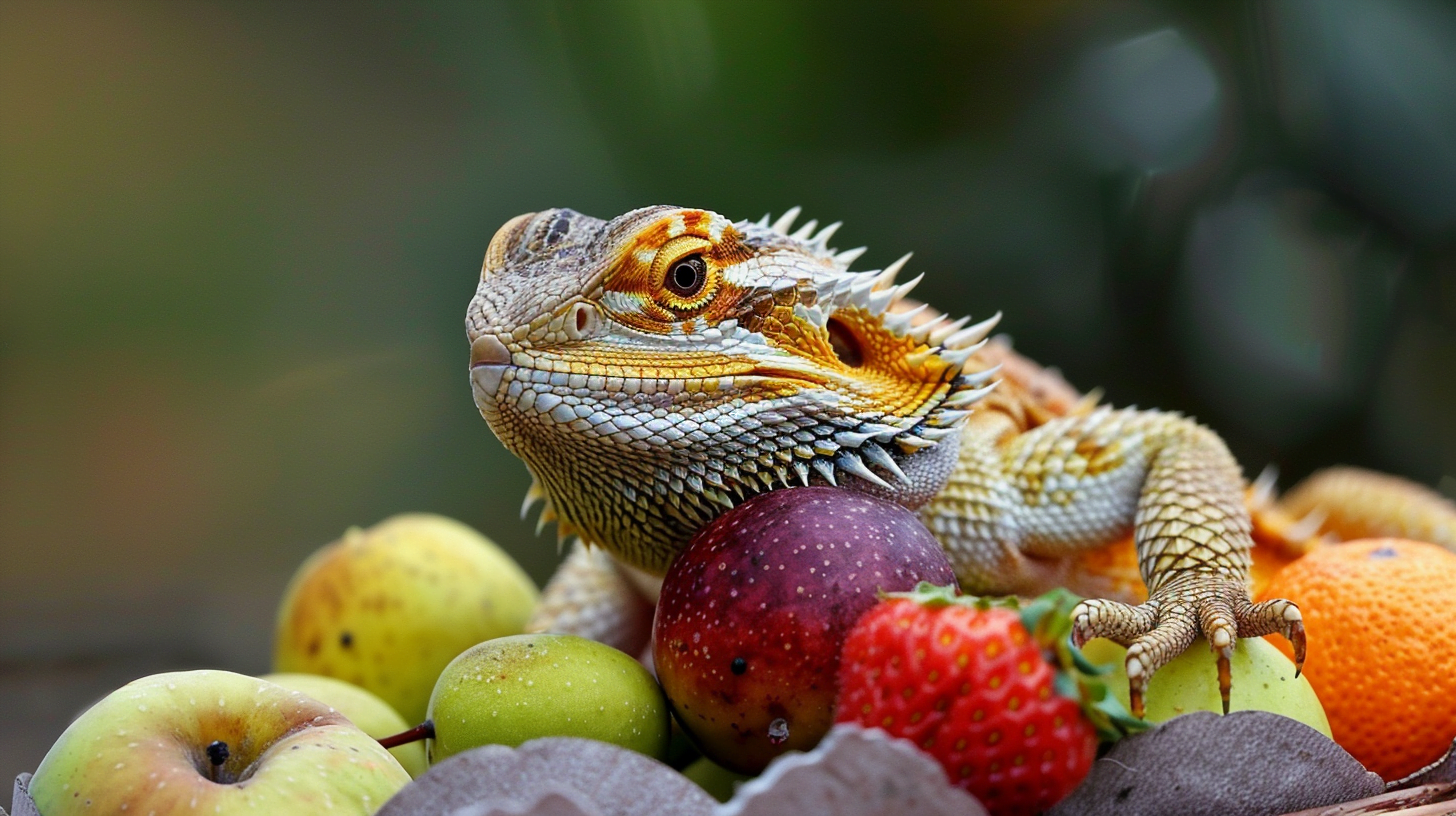Bearded dragons are fascinating pets known for their unique appearance, friendly nature, and relatively easy care. However, one crucial aspect of their well-being that often raises questions among owners is hydration. Understanding your bearded dragon’s water needs is crucial for their health and happiness. In this article , we’ll dive deep into the topic of how long can a bearded dragon go without water and provide you with essential information to keep your scaly friend thriving.
Why Water Is Essential for Bearded Dragons
Water plays a vital role in the overall health of bearded dragons. Proper hydration is key for maintaining organ function, aiding digestion, and facilitating smooth shedding. When bearded dragons become dehydrated, they can face serious health issues such as:
- Kidney problems
- Constipation
- Lethargy and weakness
Bearded dragons obtain water through various means, including:
- Drinking from a water dish
- Consuming moisture-rich foods
- Absorbing water through their skin in humid environments
The Role of Water in Organ Function
Water is essential for the proper functioning of a bearded dragon’s organs. It helps regulate body temperature, transport nutrients, and remove waste products. When a bearded dragon becomes dehydrated, their organs may struggle to perform these vital tasks, leading to potential health complications.
Hydration and Digestion
Adequate hydration is crucial for maintaining a healthy digestive system in bearded dragons. Water helps break down food, making it easier for the body to absorb nutrients. Dehydration can lead to constipation, which can cause discomfort and even impaction if left untreated.
The Importance of Hydration for Shedding
Bearded dragons, like many reptiles, shed their skin periodically as they grow. Proper hydration is essential for ensuring a smooth and comfortable shedding process. When a bearded dragon is well-hydrated, its skin remains supple and elastic, allowing the old skin to come off easily. Dehydration, on the other hand, can result in incomplete or difficult shedding, which may require intervention from the owner.
Factors Affecting How Long a Bearded Dragon Can Go Without Water
Several factors influence the length of time a bearded dragon can survive without access to water:
| Factor | Impact on Water Needs |
|---|---|
| Age | Baby and juvenile beardies need more frequent hydration than adults |
| Size | Larger dragons have more water reserves than smaller ones |
| Environment | Hot, dry habitats increase water loss through evaporation |
| Diet | Feeder insects and veggies with high water content provide extra hydration |
| Health | Illness or stress can impact water intake and retention |
It’s important to consider these factors when assessing your beardie’s hydration needs and ensuring they always have access to clean, fresh water.
Age and Size
A bearded dragon’s age and size play a significant role in determining how long they can go without water. Baby and juvenile bearded dragons have higher metabolisms and smaller body sizes, which means they require more frequent hydration than adult beardies. As bearded dragons grow and mature, their water reserves increase, allowing them to go longer periods without drinking.
Environmental Factors
The environment in which a bearded dragon lives can greatly impact their water needs. In hot, dry habitats, bearded dragons lose water more quickly through evaporation from their skin and respiratory tract. This is why it’s essential to monitor the temperature and humidity levels in your beardie’s enclosure and adjust them as needed to prevent dehydration.
Diet and Hydration
The diet you provide your bearded dragon can also affect their hydration levels. Feeder insects and vegetables with high water content, such as crickets, hornworms, and leafy greens, can provide extra hydration. However, it’s important to note that these food sources should not be relied upon as the sole means of hydration. Bearded dragons still require access to fresh, clean water in a shallow dish.
Health and Stress
Illness and stress can significantly impact a bearded dragon’s water intake and retention. When a beardie is sick or stressed, they may be less likely to drink or eat moisture-rich foods, leading to dehydration. Additionally, certain health conditions, such as kidney disease or diarrhea, can cause excessive water loss, making it even more crucial to monitor your pet’s hydration levels closely.
Signs of Dehydration in Bearded Dragons
Knowing how to recognize dehydration in your bearded dragon is essential for catching potential issues early. Some common signs of dehydration include:
- Sunken eyes, wrinkled skin, and loss of skin elasticity
- Thick, stringy saliva and sticky mucus membranes
- Lethargy, weakness, and loss of appetite
- Infrequent, small, or hard fecal pellets
- Darker colored urine or lack of urination
If you notice any of these symptoms, it’s crucial to take action and provide your beardie with water immediately.
The Pinch Test
One simple way to check your bearded dragon’s hydration status is by performing the “pinch test.” Gently pinch the skin between your beardie’s shoulders. If the skin snaps back into place quickly, your dragon is likely well-hydrated. However, if the skin remains “tented” or takes a while to return to its original position, it may indicate dehydration.
Monitoring Urine Output
Another way to assess your bearded dragon’s hydration is by monitoring their urine output. Well-hydrated beardies typically produce clear to light yellow urine. If you notice your dragon’s urine becoming darker or more concentrated, it may be a sign of dehydration.
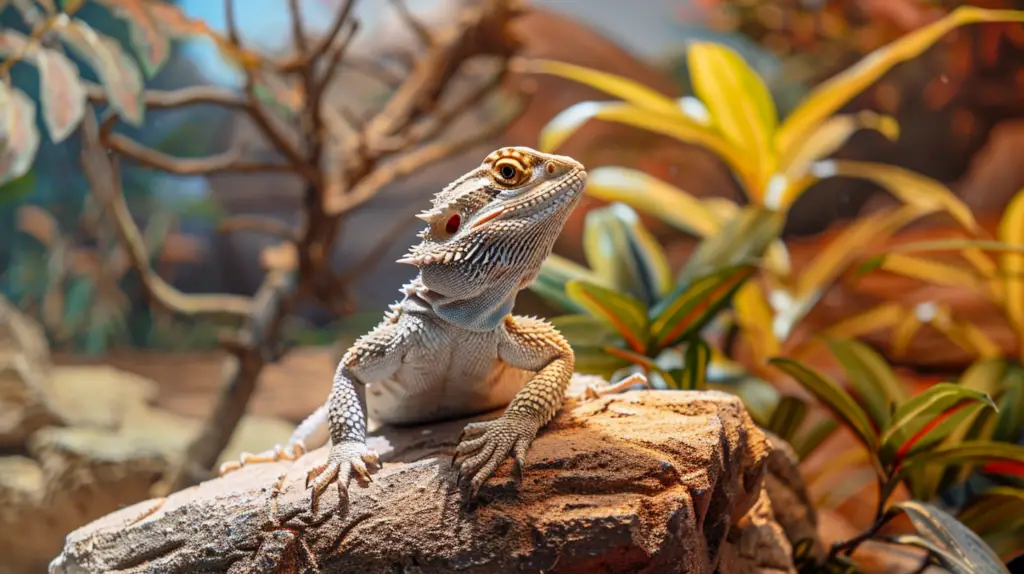
How Long Can a Bearded Dragon Typically Survive Without Water?
The length of time a bearded dragon can go without water varies based on the factors mentioned earlier. Here’s a general guideline:
- Adult bearded dragons: Can generally survive 1-2 weeks without drinking if they’re healthy and well-hydrated.
- Juveniles and babies: May only last a few days to a week without water.
However, it’s important to note that these are rough estimates, and factors like temperature, humidity, and diet can significantly affect this timeframe. It’s always best not to test your beardie’s limits and to provide fresh water daily.
Tips for Keeping Your Bearded Dragon Hydrated
To ensure your bearded dragon stays well-hydrated, follow these tips:
- Offer a shallow, clean water dish daily and refresh it regularly
- Mist greens with water before feeding
- Provide a humid hide or occasional bath for shedding
- Use a dropper or syringe to drip water onto your beardie’s snout if needed
- Monitor humidity levels and adjust if too low
By incorporating these practices into your bearded dragon’s care routine, you can help prevent dehydration and keep your pet healthy.
Providing a Water Dish
One of the most important things you can do to keep your bearded dragon hydrated is to provide a shallow, clean water dish in their enclosure. The dish should be large enough for your beardie to soak in if they choose, but not so deep that they could drown. Be sure to refresh the water daily and clean the dish regularly to prevent the growth of harmful bacteria.
Misting Greens and Offering Baths
In addition to providing a water dish, you can also help keep your bearded dragon hydrated by misting their greens with water before feeding. This adds extra moisture to their diet and can encourage them to eat more. Occasionally offering your beardie a shallow bath or misting them with a spray bottle can also help maintain proper hydration, especially during shedding.
Using a Dropper or Syringe
If you notice your bearded dragon is not drinking from their water dish or showing signs of dehydration, you may need to offer water more directly. Using a dropper or syringe, you can gently drip water onto your beardie’s snout, encouraging them to drink. Be patient and persistent, as some dragons may take time to get used to this method.
When to Seek Veterinary Care for Dehydration
In some cases, dehydration can become severe and require veterinary intervention. Seek professional care if:
- Your bearded dragon shows signs of severe dehydration
- Dehydration is accompanied by other symptoms like diarrhea or lack of appetite
- Your beardie refuses to drink or hasn’t had water access for over a week
A skilled reptile veterinarian can assess your bearded dragon’s condition and provide appropriate treatment, which may include fluid therapy or addressing underlying health issues.
Case Study: Gizmo’s Dehydration Scare
Gizmo, a 3-year-old bearded dragon, was brought to the vet by his concerned owner after showing signs of dehydration. Gizmo had sunken eyes, wrinkled skin, and was lethargic. The vet performed a physical examination and ran some tests, revealing that Gizmo was severely dehydrated and had an underlying respiratory infection.
The vet administered fluid therapy to rehydrate Gizmo and prescribed antibiotics to treat the infection. Gizmo’s owner was instructed to continue offering fresh water daily and to monitor Gizmo’s hydration levels closely. With proper treatment and care, Gizmo made a full recovery and was back to his lively self within a week.
This case study highlights the importance of seeking veterinary care when dehydration becomes severe or is accompanied by other symptoms. It also emphasizes the crucial role that proper hydration plays in a bearded dragon’s overall health and well-being.
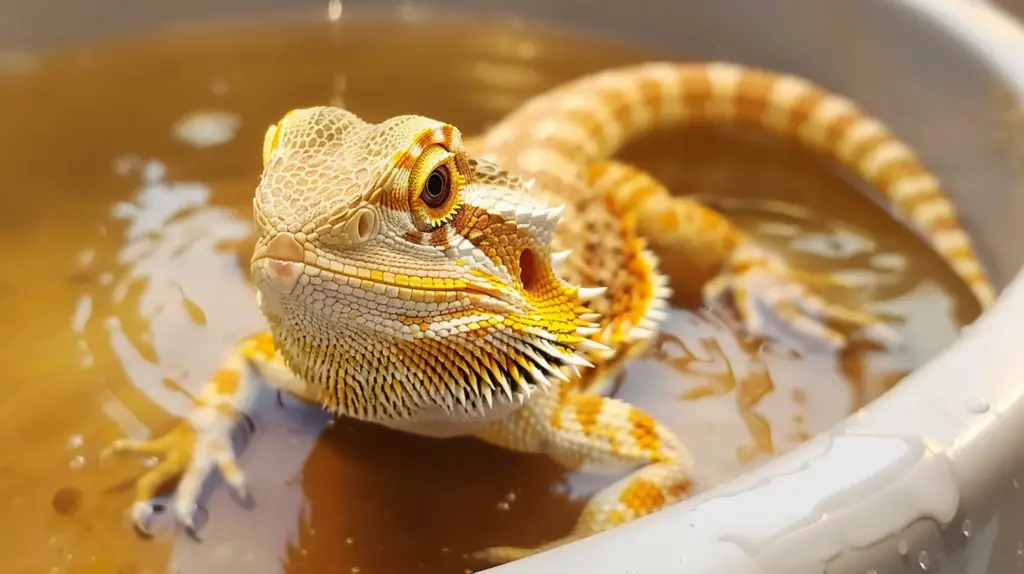
Conclusion
In conclusion, while adult bearded dragons can potentially survive 1-2 weeks without water, it’s crucial to provide fresh, clean water daily to maintain their health and well-being. By understanding the factors that affect hydration, recognizing signs of dehydration, and implementing proper care practices, you can ensure your beloved beardie stays hydrated and thrives under your care.
Remember, if you ever suspect your bearded dragon is severely dehydrated or showing signs of illness, don’t hesitate to reach out to a reptile veterinarian for guidance and treatment. With your attentive care and love, your bearded dragon can enjoy a happy, healthy life by your side!
As a final thought, consider this quote from Dr. Scott Stahl, a renowned reptile veterinarian:
“Proper hydration is one of the most important aspects of bearded dragon care. By providing fresh water, moisture-rich foods, and a well-regulated environment, you can help ensure your beardie lives a long, healthy life.”
So, always keep an eye on your bearded dragon’s hydration levels, and never underestimate the power of fresh, clean water in keeping your scaly friend happy and thriving!
